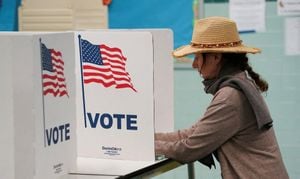With just days remaining until Election Day, the 2024 U.S. presidential race is heating up, especially between Vice President Kamala Harris and former President Donald Trump. Harris, currently aiming to solidify support among various demographics, is facing challenges from within her party and from Trump's aggressive campaigning strategies. The stakes are particularly high as polling indicates neck-and-neck races across pivotal battleground states, making every rally and announcement count.
The latest CBS News poll reveals deadlock between the two leading candidates. Recent figures show Kamala Harris and Donald Trump tied in Pennsylvania, one of the key states capable of swinging the election due to its 19 electoral votes. Having both hit the campaign trail fiercely, Harris aimed her efforts at rallying support across the Midwest, even as Trump concentrated on his strongholds, including the South.
Specifically on Friday night, both candidates held competing rallies just seven miles apart in Milwaukee, Wisconsin. Trump's rally downtown attracted numerous supporters, but so did Harris's gathering at Wauwatosa, its surrounding suburb. Both camps reported similar attendance numbers, underscoring the competitiveness of the state where voters consistently lean slightly Democratic.
Historically, Wisconsin’s electoral decisions have often come down to razor-thin margins, with four out of the last six presidential elections decided by less than 1 percent. This upcoming election may mirror those close contests, with local strategies highly leveraged by both parties.
While the significance of these rallies cannot be understated, voters are also reacting to the nuances of the candidates' policies on pressing issues, such as military support and marijuana legalization. Harris’s administration draws from established Democratic norms under President Biden focusing on maintaining support for armed forces, contrasted against Trump’s more contentious military positioning.
On the side of drug policy, Harris previously supported legalizing marijuana and expunging nonviolent offenses during her time as senator, whereas Trump has shown hesitant support and voiced opinions on allowing medical research on cannabis without full-scale nationwide legalization.
With Election Day only days away, such poignant stances on policy could sway undecided voters, particularly as the dynamics shift. For example, students and younger voters, who often favor progressive stances on issues like marijuana, might be persuaded by Harris's legislative history.
The early voting period reflects marked engagement from the electorate. According to reports from the University of Florida, upwards of 68 million voters have cast their ballots already—both mail-in and early voting. These figures highlight the electorate's enthusiasm compared to previous elections, though concerns around ballot security continue to loom, especially following several disturbing incidents related to election processes across the nation.
The political climate is increasingly charged with concerns over election integrity, illustrated vividly by the Supreme Court’s recent decision, which declined to block counts of certain provisional ballots—a significant ruling for Pennsylvania. This ruling ensures votes cast by individuals whose mail-in ballots lacked proper sealing, often due to unintentional errors, would still be counted, reflecting efforts to preserve voter access and integrity.
Meanwhile, Harris's campaign is launching ads emphasizing her vision for leadership, focused on economic growth and accountability, aiming to capture undecided and infrequent voters during the final media blitz leading up to the vote. Her ad, titled "Brighter Future," will target key demographics to reach those still weighing their options.
Notably, one of Harris's recent pledges involves eliminating unnecessary college degree requirements for federal jobs through executive orders on her first day if elected. This initiative is likely to resonate well with voters fatigued by the inflated requirements for government positions.
Trump, on the other hand, continues to double down on counterpunches, recently targeting Harris through his connections with various figures, including Liz Cheney, who he accuses of being disloyal to Republican values. Trump's rhetoric is often inflammatory, with some of his latest comments stirring controversy and raising eyebrows over the safety of the electoral environment.
Violence has crept back onto the campaign scene, with accounts of aggressive encounters reported. A man recently faced charges for allegedly attempting to run over campaign canvassers supporting Harris, showcasing the heightened tensions surrounding the election.
Globally, the current election results may have repercussions beyond the U.S. border, particularly affecting Democrats' relationships with Arab-American voters. Notably, there's been a noticeable shift among traditionally loyal voter demographics, particularly following the administration's handling of the conflict between Israel and Gaza. This situation has left many voters feeling disillusioned with the Democratic Party and has sparked protests welcoming Harris with criticisms.
Arab-American voters have expressed their frustrations, urging others to reevaluate their longstanding allegiance to the Democratic Party amid the perceived abandonment of their issues. Several rallies have witnessed interruptions from protesters voicing strong opposition, pushing Harris to navigate these tumultuous waters carefully.
Association with celebrities and cultural icons has also proven influential during this campaign season, particularly as Harris has garnered support from major personalities endorsing her policies. Latino voters have become another focal point, responding to Trump’s derogatory remarks about Puerto Rico made at recent events, which backfired as many from the community rallied to support Harris.
Through strategic alliances and focused messaging, Harris’s team emphasizes their commitment to mobilizing votes, especially among Latinos, who are considered pivotal across key battleground states like Pennsylvania and Arizona. This campaign effort has included substantial outreach, such as door-knocking initiatives and mutual endorsement from various local organizations representing Latino communities.
Harris’s campaign is pulling all the stops, seeking to influence undecided voters right up until polls close, with strategies ranging from anticipated television ad buys during popular segments to exemplary grassroots campaigning, as seen with local political leaders making appearances to rally support.
Despite all promises and strategies, uncertainties remain, and how the final days of campaigning will affect voter turnout and decision-making is still to be determined. With Democrats and Republicans alike praying their respective bases will show up, the final narrative of this election is currently being written by voters.
Both candidates will likely continue to amplify their key messages as Election Day approaches, with each campaign holding its breath, hoping its strategies resonate with the American public. The cultural milieu and the present events serve as reminders of both the stakes involved and the volatile terrain of current U.S. politics.



